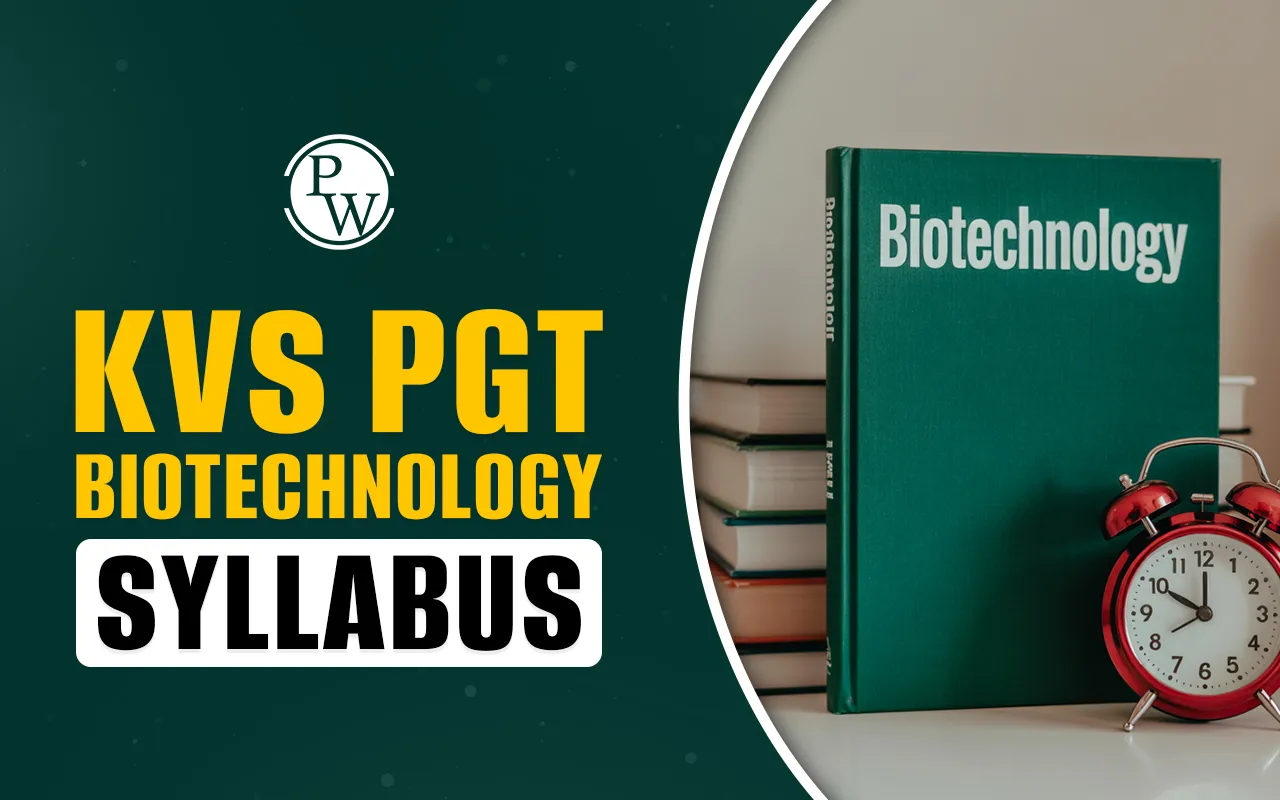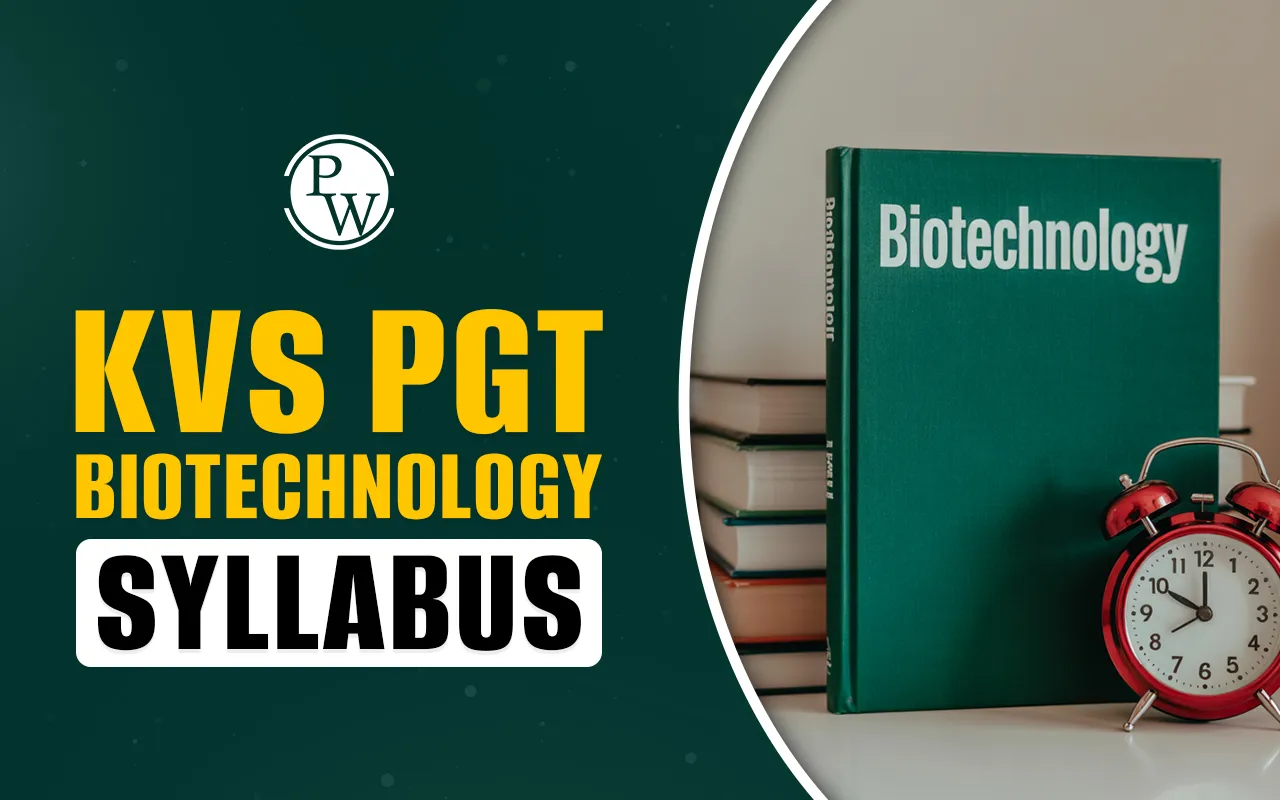

KVS PGT Biotechnology Syllabus 2025: Kendriya Vidyalaya Sangathan (KVS) is a well-known and trusted educational organization in India. Recently, they released the official KVS Recruitment 2025-26 Notification for multiple teaching posts. With the recruitment notification, KVS PGT Biotechnology Syllabus 2025 has also been published by the organization. This PGT Biotechnology Syllabus is one of the most important documents for every aspirant because this document tells the candidates about all the topics that can be asked in the exam.
A complete syllabus helps the candidates plan their preparation in an orderly way. They can create a proper timetable, focus on important units, and have a clear preparation strategy without any confusion.
KVS PGT Biotechnology Syllabus 2025
The KVS PGT Biotechnology Syllabus 2025 has a wide range of topics from the subject of biotechnology. Some of the major units are Cell Biology, Genetics, Microbiology, Plant Biotechnology, Animal Biotechnology, Genetic Engineering, Bioprocessing and Fermentation, Industrial Biotechnology, Bioinformatics, and Modern Trends in Biotechnology.
The KVS PGT Biotechnology Syllabus 2025 has been framed in such a way that a PGT teacher must be knowledgeable in these topics. He must also be able to demonstrate the practical application of these scientific concepts. The candidates must study all these units in detail because both objective and descriptive questions will come from these topics. Below is the unit-wise detailed syllabus in clear academic English.
Unit 1: Biomolecules
This is the foundation of biotechnology. Candidates must know the chemical nature, classification, and functions of biomolecules.
This unit includes:
-
Carbohydrates: monosaccharides, polysaccharides, glycosidic bonds
-
Proteins: amino acids, peptide bonds, protein folding, denaturation
-
Enzymes: properties, classification, enzyme kinetics, inhibition
-
Lipids: triglycerides, phospholipids, steroids
-
Nucleic acids: DNA and RNA structure, nucleotides, base pairing
-
Vitamins and coenzymes
These concepts form the basis for units on cell biology, genetics, and metabolism.
Unit 2: Cell Biology
A central part of the syllabus focuses on the structure and organization of cells.
Topics include:
-
Prokaryotic vs eukaryotic cells
-
Cell organelles: mitochondria, chloroplasts, nucleus, ER, Golgi body
-
Plasma membrane structure (Fluid Mosaic Model)
-
Cell transport: diffusion, osmosis, active transport
-
Cell cycle: phases, checkpoints, regulation
-
Mitosis and meiosis with diagrams
-
Cell communication and signaling pathways
Cell Biology is important because many descriptive questions come from this unit.
Unit 3: Genetics
A high-weightage unit covering classical and molecular genetics.
Topics include:
-
Mendel’s laws
-
Gene interactions
-
Chromosome theory of inheritance
-
Linkage and recombination
-
Sex determination
-
Mutations: types, causes, effects
-
DNA replication (enzymes, mechanism)
-
Transcription and translation
-
Genetic code, gene expression, operon concept
This is a scoring area because concepts are clear and predictable.
Unit 4: Microbiology
This unit deals with microorganisms and their industrial and medical applications.
Topics include:
-
Microbial classification: bacteria, virus, fungi
-
Microbial morphology and structure
-
Pure culture techniques
-
Growth curve
-
Sterilization and disinfection
-
Microbial nutrition
-
Applications of microbes in industry, environment, and medicine
Unit 5: Plant Biotechnology
An important part of applied biotechnology, especially relevant for agriculture.
Topics include:
-
Plant tissue culture
-
Callus formation, micropropagation
-
Somatic hybridization
-
Agrobacterium-mediated transformation
-
Transgenic plants (BT cotton, Golden rice)
-
Biofertilizers and biopesticides
-
Applications in crop improvement
Unit 6: Animal Biotechnology
This section focuses on animal cell culture and modern technologies.
Topics include:
-
Animal cell structure
-
Culture media and conditions
-
Primary vs secondary culture
-
Hybridoma and monoclonal antibodies
-
Animal cloning (somatic cell nuclear transfer)
-
Recombinant vaccines
-
Stem cell technology and applications
Unit 7: Genetic Engineering
One of the most important and scoring units in biotechnology.
Topics include:
-
Restriction enzymes
-
Vectors: plasmids, phages, cosmids
-
PCR and gel electrophoresis
-
DNA ligase, polymerases
-
Cloning steps
-
Genomic and cDNA libraries
-
Blotting techniques (Southern, Northern, Western)
This unit is directly linked to biotechnology industries and research laboratories.
Unit 8: Industrial & Environmental Biotechnology
This unit explains biotechnology in industries and environment.
Topics include:
-
Fermentation
-
Bioreactors: types and applications
-
Production of alcohol, enzymes, antibiotics
-
Wastewater treatment
-
Bioremediation and biodegradation
-
Biofuels (biogas, biodiesel)
-
Single cell protein
Unit 9: Bioinformatics
This is an important modern biotechnology topic.
Topics include:
-
Biological databases (GenBank, EMBL, PDB)
-
Sequence alignment: BLAST, FASTA
-
Genome analysis tools
-
Human Genome Project
Unit 10: Recent Advances in Biotechnology
Latest developments that may be asked in descriptive questions.
Topics include:
-
CRISPR-Cas9
-
Gene therapy
-
GM crops
-
DNA fingerprinting
-
Stem cell research
-
Nanobiotechnology
KVS PGT Biotechnology Syllabus PDF
KVS has released the complete PGT Biotechnology syllabus PDF along with the recruitment notification. Candidates can download the official PDF from the KVS website or link provided below. Keeping the PDF is very helpful because it shows the exact topics, exam pattern, and marking scheme. Having the syllabus in PDF format also helps candidates revise daily without confusion.
KVS PGT Biotechnology Exam Pattern 2025
KVS PGT Biotechnology Tier-2 is the most important stage because it directly determines the merit list.
| KVS PGT Biotechnology Tier-2 Exam Pattern 2025 | ||||
| Components of Test | Type of Questions | No. of Questions | Total Marks | Duration |
| Subject Knowledge | Objective | 60 | 60 | 2.5 Hours (Total) |
| Subject Knowledge | Descriptive | 10 | 40 | |
| Total | — | 70 | 100 | 2.5 Hours |
